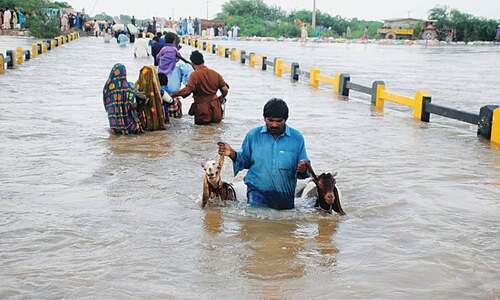KARACHI: Absence of a drainage system was identified as a major reason for last year’s devastating flooding across Sindh at a workshop held on Friday to discuss a draft document of the National Water Conservation Strategy 2022-2027 and look into the implementation of the provincial National Water Policy 2018.
Jointly organised by the Pakistan Council of Research in Water Resources (PCRWR), International Water Management Institute (IWMI)-Pakistan and Federal Flood Commission (FFC), the event was attended by experts and officials representing several government departments including Water and Power Development Authority, Sindh Environmental Protection Agency and Sindh Irrigation and Drainage Authority.
Presenting a detailed overview of the national water conservation strategy’s draft, PCRWR secretary Dr Hifza Rasheed explained the need for a conservation policy and strategy and its priorities.
“The key objectives are to ensure conservation of water, minimise wastage, secure equitable distribution both across and within provinces and support service providers to develop best management practices for water conservation in agriculture, domestic and industrial sectors,” she said.
Experts say unfair water distribution also contributing to poverty
These steps would not only help minimise financial dependence on federal and provincial governments, but also provide actionable information about water conservation in all sectors ensuring water security under changing climate, she added.
Dr Rasheed, who also holds the charge of PCRWR director general, said the national strategy on water conservation aimed to improve water productivity by introducing water-efficient technologies, optimise groundwater abstraction and balance with recharge and develop non-conventional water sources for agriculture, for instance, secondary treated sewage water.
“In addition, we want to promote the use of information technology for water resources management in all sectors and bring about irrigation efficiency.”
The speakers included Engineer Hafiz Abdul Salam and Dr Ghulam Murtaza, PCRWR regional directors at Tandojam and Karachi, respectively.
Obstacles identified
During the discussion, the stakeholders, including researchers from several public universities, highlighted the water challenges hampering provincial growth and progress. It was pointed out that while officials were quick to blame climate change, the absence of a drainage mechanism in the province led to last year’s flooding, which affected millions of people and caused losses of billions of rupees.
“The drainage system doesn’t exist from Karachi to Kashmore as natural drains have been encroached,” Prof Altaf Sial of Agriculture University Tandojam said.
Several districts in the province, the speakers pointed out, were flooded when some 8MAF water flowed down to Sindh from Balochistan, while emphasising the need for tackling the issue by building reservoirs that would not only help save Sindh from devastation in future, but also help meet needs of water-starved areas of Balochistan.
There was consensus that unequal and unfair distribution of water across the province was an important factor that had aggravated shortages across Sindh, also contributing to poverty.
It was suggested that the water losses estimated to be between 30 per cent to 40pc in the province could be addressed by ensuring lining of water courses, which should be carried out in a scientific manner, without disturbing the natural process of recharging of groundwater resources.
On the matter of water audit and pricing, some participants expressed concern over the quality of water and said these steps would be hard to implement unless the government ensured that consumers received safe water.
A few stakeholders expressed reservations over reluctance on part of the government departments on sharing their data to ensure water efficiency.
The participants’ recommendations included establishment of provincial authorities for groundwater management, launch of awareness programmes, promotion of water conservation strategies at all levels and formulation of enforcement of zero liquid discharge for residential and commercial consumers.
Federal Flood Commission Chairman Ahmad Kamal, PCRWR chairman Dr Muhammad Ashraf, and IWMI country representative Dr Mohsin Hafeez, also joined the workshop via zoom and briefed the audience regarding the need for the national water conservation strategy, relevant issues in Pakistan, while emphasising the need for having a consensus over the quantification of specific datasets such as efficiency of irrigation system.
Published in Dawn, January 7th, 2023









































